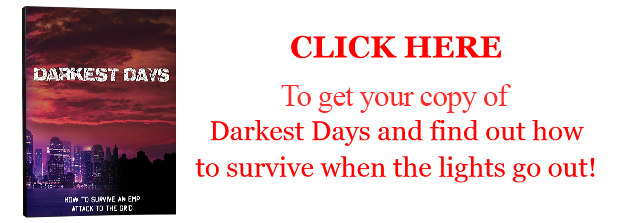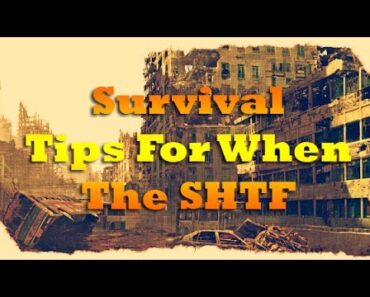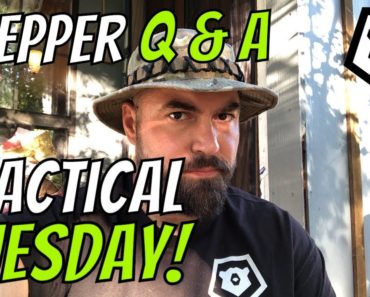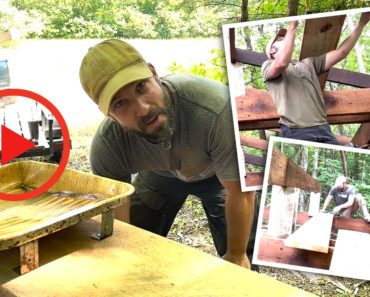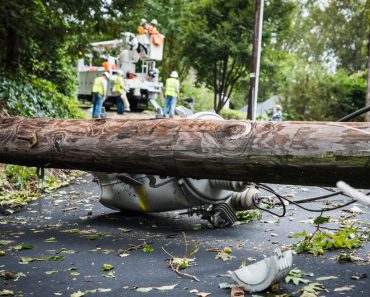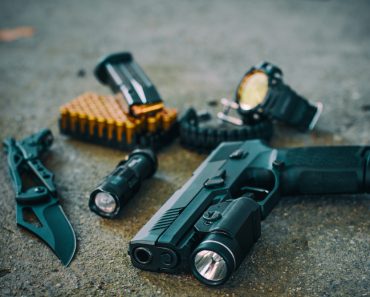The military term OPSEC has been adopted by the prepping community to denote the actions we take to keep friends and neighbors from knowing that we’re preppers. That’s a good thing and something we should all practice. Letting people know that you’re a prepper amounts to inviting them to show up on your doorstep when things go bad, even if that’s not your intention. Trust me, I know. I’ve been writing about prepping for over a decade and I’ve lost track of how many people have assumed that meant they could come knocking on my door when a disaster happened. The only reason more didn’t when COVID first broke out, was because they were afraid to leave their homes.
But OPSEC doesn’t end when the disaster strikes. If anything, we need to up our game a notch, once we switch from “prepping mode” to “survival mode.” As we all know, there will be a lot of desperate people out there, and they’ll be looking for whatever they can find. That clearly includes whatever we have.
It’s one thing to try and hide the fact that you’re stockpiling supplies. Most people don’t pay attention to how often you go grocery shopping or how much you buy. But you can be sure they’ll notice if you’re living well and not suffering like everyone else when things go bad. That’s when OPSEC will become truly important. But it’s also when OPSEC will be harder to maintain. Anything that could give people the idea that you have food, water, will cause them to either come knocking on your door, trying to kick down your door, or trying to spy on you and see what you have, before coming to kick down your door.
The question for us, is how do we keep that from happening; and at least part of the answer is through our OPSEC.
Smells
Probably the hardest thing to keep covert is the smell of food cooking. Not only is that something that we all recognize, it’s also something that we become more sensitive to, when we’re hungry. With everyone around us starving, cooking food, without them coming knocking on our doors is going to be a real challenge.
If you look online for how to eliminate cooking odors, most of the answers you’ll find deal with getting rid of food odors after the fact or covering them up with other food odors. Making a pot of coffee, to cover up the smell of something else you’ve cooked isn’t going to be very effective, as the coffee will attract at least as many people as the food will.
This isn’t to say that you can’t mask food odors with other odors, without attracting attention though. Aromatic plants, such as mint, basil and lavender will help cover up food odors, by giving people something else to smell, which is rather obvious and isn’t normally thought of as food. While we use basil and mint in cooking, most people aren’t accustomed to thinking of them as more than herbs. The aren’t likely to think of cooking basil soup.
But there are some things we can do. To start with, do your cooking someplace where the smells can be contained. The best location I can come up with for that is the basement. That may not go well with other considerations, like safety when cooking with wood; but with proper care, it can still be done.
Baking soda has long been used to absorb food smells and can be used in these circumstances as well. Open bowls, containing baking soda, placed around your cooking area, will help absorb food odors. Another similar thing is to use a splatter screen with a charcoal filter. That will catch the odors before they even leave the pot or pan.
Boiling food to cook it can also help to hide the natural odors that the food produce. While boiling won’t hide the odors completely, it will reduce them somewhat, making it easier for the baking soda and charcoal to do their jobs.
Weight Loss
Speaking of food, we can pretty much count on everyone around us losing weight, due to the lack of food. If we’re not losing weight as well, that will prove to them that we have food, at least in their minds. We’ll need to go on a serious diet, so that we lose weight as well, or we’ll give ourselves away.
When I say “serious diet,” I’m referring to 1,500 calories per day or less. I needed to lose a bunch of weight once and dropped down to 1,000 calories a day for several months. That may seem impossible, and goes against the advice of nutritionists, but it didn’t negatively affect my health in any way. If anything, I was healthier during and after that diet, than before it.
What kinds of calories we eat makes a lot of difference as well. Many stockpiling lists I see are heavy on carbohydrates, while being light on everything else. I understand this, as roughly 50% of the average diet is made up of carbohydrates. Besides, those foods are generally the lowest-cost foods we can buy. However, carbohydrates are quickly converted to sugar in our body, giving us a boost of energy that doesn’t last. We’d actually be better off with more fats and proteins, if we want to have energy that will keep us going all day long.
Another trick that might help is to buy used clothes which are too big for you. Baggy clothes give the impression that you’ve recently lost a lot of weight. Wearing them when in the public eye makes it look like you’ve lost more weight than you have.
Trash
Right along with food is the problem of dealing with trash. Investigators have long known that clues about a person or family’s life can be gained from looking at their trash; even archeologists do it. We’ve all seen that enough in police shows, that anyone is going to know to check the trash in order to find our who’s eating.
The easy solution to this is to burn your trash. But you want to be careful about how you do that, as burning trash on its own is a dead giveaway. Rather, you want to burn your trash as part of other burning operations, such as boiling water to purify it. Lots of people will be doing that, so if you can use burning trash for at least part of the fuel to boil your water, it will explain the burning away, without giving out the secret that you have packaging from your food.
Of course, repackaging your food stockpile can help with lowering the overall amount of trash you have to deal with. You’re not going to burn five-gallon buckets; so anything repackaged for storage in them is going to reduce your disposal problem.
Waste Water
Another form of “trash” is our waste water. There’s a good chance that your municipal water and wastewater will go down in a serious enough crisis. We all have plans for harvesting water, should that be the case. But unless you happen to have a septic system, you’re going to have to come up with something to do with all your wastewater. Letting it run down the gutters and into the storm sewers is not only an environmental problem., it can easily be traced back to your home, letting people know that you have water.
The best and easiest solution here is to use greywater recycling. Grey water is any waste water from your home, other than that which goes down the toilet. Most of that water really isn’t all that dirty and can be used for other cleaning tasks. As a final way to dispose of that water, use it to water your garden. I’ve watered my vegetable garden with grey water for years and it has worked well.
Light
You wouldn’t think that light could be that much of a problem; but if your house is the only one with lights on, it will be visible for miles. That alone will tell people that you’re better off than they are, leading them to believe that you probably have food as well.
If you’re going to be burning any sort of light indoors, you need to have blackout curtains over the windows of those rooms, keeping the light from escaping. You’ll want to do that, even if your neighbors know you have power. There’s no advantage to be gained by flaunting your relative affluence, showing off that you have light.
A little reverse-English might be appropriate here. There’s no way to hide that you have solar panels on your home, so don’t try. Instead, share your electricity with the neighbors, by putting a plug strip out by your gate, allowing them to recharge their phones and other devices. The good will you generate might help to overcome any feelings of resentment that they might have.
Noise
Hand-in-hand with the problem of light, is the problem of noise. With pretty much everything shut down, the world will become eerily quiet. That will make any sounds more apparent, whether it’s your chickens clucking, the use of a power tool, or your kids watching a movie. Some of these sounds might attract attention to your home.
There’s not much you can do about much of this noise. It’s not like you can keep chickens from clucking or goats from breying. Chain saws are noisy and so are electric ones. But there’s no sense making unnecessary noise that will attract attention. If your kids are going to watch a movie, just don’t turn the volume up enough to attract all the other kids in the neighborhood.
Rather than eliminating or hiding the noise, which you probably won’t be able to do, what you really need to do is be ready to explain it. If you’re using a chain saw, a month after a disaster strikes, that’s easy to explain; you just syphoned the gas from your car. But six months later, that excuse probably won’t stand up all that good. You’ll need something a bit more complicated. The same can be said for running a generator. Saying that you had gasoline stockpiled will just get them wondering what else you have stashed away.
If you’ve got solar panels, any use of power tools will be easy to explain; but you still want to be careful. If you’re running power tools all the time, along with keeping your air conditioner running, people will be wondering just how much electric power you’ve got. Worse than that, they’ll want to use it as well.
Probably the worst thing would be to have a neighbor come over, asking to sit in your air-conditioned home. They could very easily become a more-or-less permanent fixture. Worse than that, being a semi-permanent fixture like that would allow them to see that you’re prepared, with a stockpile of food and other essential supplies. The step from that realization, to “Where’s mine?” is a short one in today’s entitlement society.


